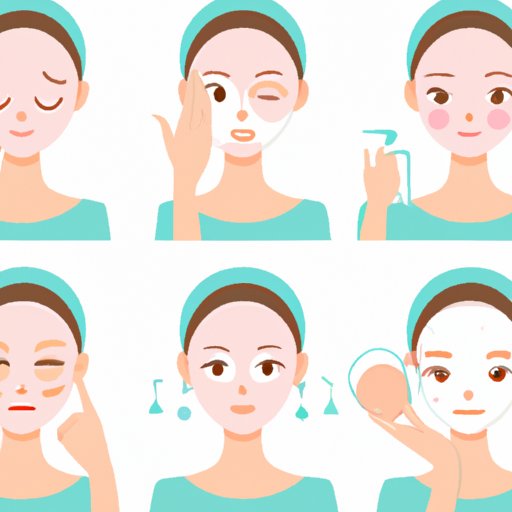
Introduction
Facials have become a popular way to pamper yourself while also maintaining healthy, glowing-looking skin. While many people enjoy getting facials, there’s a common question as to how often someone should get them. In this article, we’ll explore the benefits of regular facials, how often different skin types should get them, and how to maintain healthy skin in between appointments. We’ll also discuss the potential risks of over-frequent facials and provide expert opinions on the topic.
The Benefits and Frequency of Regular Facials
Facials offer a range of benefits, including rejuvenation, exfoliation, and hydration. Receiving regular facials can help maintain the health of the skin by removing dead skin cells, extracting impurities, and nourishing the skin. The frequency of facials should be based on a person’s age and skin type.
According to estheticians and dermatologists, most people should get a facial once every 4 to 6 weeks. However, this can vary based on skin type, age, and other factors. Younger people with normal skin can get facials less frequently, while those with oily skin may need more frequent facials.
Real-life examples reveal that people get facials for different reasons and with varying frequencies. Some people, like Kelly, a 35-year-old office manager, get facials once a month to keep their skin looking clear and healthy, while others, like Cindy, a 50-year-old hairstylist, get facials every 6 to 8 weeks to reduce signs of aging and maintain a youthful appearance.
Different Skin Types and Their Facial Needs
Different skin types have unique needs that should be considered when choosing a facial and determining its frequency. For example, dry skin types may benefit from a hydrating facial that includes a moisturizing mask or serum. Oily skin types may benefit from deep cleaning facials that include steam and extractions.
Estheticians recommend that those with dry skin get a facial once every 6 to 8 weeks, while those with oily skin may benefit from getting facials every 3 to 4 weeks. Combination skin types should get facials every 4 to 6 weeks, while those with sensitive skin should avoid harsh facials altogether and instead opt for gentler treatments like a hydrating facial.
Personal anecdotes from people with different skin types reveal that finding the right frequency and type of facial can greatly improve the appearance and health of the skin. Sarah, a 27-year-old with dry skin, found that getting facials every 2 months helped her skin feel less tight and more hydrated. On the other hand, Karen, a 45-year-old with oily skin, reported that getting facials every 3 weeks improved the overall texture and appearance of her skin.
How to Know When Your Skin Needs a Facial and How to Maintain Healthy Skin in Between Appointments
There are several warning signs that your skin may need a facial, including dullness, breakouts, and dryness. If you notice any of these signs, it may be time to schedule a facial appointment. In the meantime, there are DIY skincare tips that you can follow to maintain healthy skin, such as regular cleansing, moisturizing, and wearing sunscreen.
Estheticians also recommend using certain supplements and skincare products to boost skin health in between facials. Vitamin C supplements can help boost collagen production and reduce the appearance of fine lines and wrinkles, while hydrating serums can improve skin’s moisture content.
Potential Drawbacks of Over-Frequent Facials and How to Strike a Balance in Your Skincare Routine
While facials offer many benefits, over-frequent facials can be harmful to the skin. Overuse of harsh exfoliants and treatments can cause skin irritation, redness, and dryness. It’s essential to find the right balance in your skincare routine and adjust your facial frequency based on your skin’s evolving needs.
Personal stories from people who struggled to find the right balance reveal that it can take some time and experimentation to determine the ideal frequency and type of facial. For example, Lisa, a 33-year-old esthetician, recalls becoming addicted to facials and ultimately developing skin issues as a result. She learned to scale back her facial frequency and choose gentler treatments to avoid over-exfoliating and damaging her skin.
Expert Opinions: What Skincare Professionals Recommend for How Often to Get Facials and Why
Skincare professionals, including estheticians, dermatologists, and beauty bloggers, have varying opinions on how often to get facials and the benefits that come with it. For example, celebrity esthetician Renee Rouleau recommends that most people get a facial every 4 to 6 weeks to maintain healthy skin, while dermatologist Whitney Bowe advises those with acne-prone skin to get facials every 2 to 4 weeks.
Choosing the right skincare professional for your skin type and specific facial needs is essential to achieving optimal results. Those with sensitive or acne-prone skin should seek out estheticians who specialize in those areas, while those with aging skin may benefit from seeing a dermatologist or plastic surgeon.
Conclusion
Facials offer numerous benefits for the skin, including rejuvenation, exfoliation, and hydration. It’s essential to determine the ideal frequency and type of facial based on your age, skin type, and overall skincare goals. In between appointments, it’s important to maintain healthy skin by following a regular skincare routine and using supplements and other products to improve skin health. Finding the right balance in your skincare routine can be a process of trial and error, but with the help of skincare professionals and personal experimentation, you can achieve optimal skin health.





